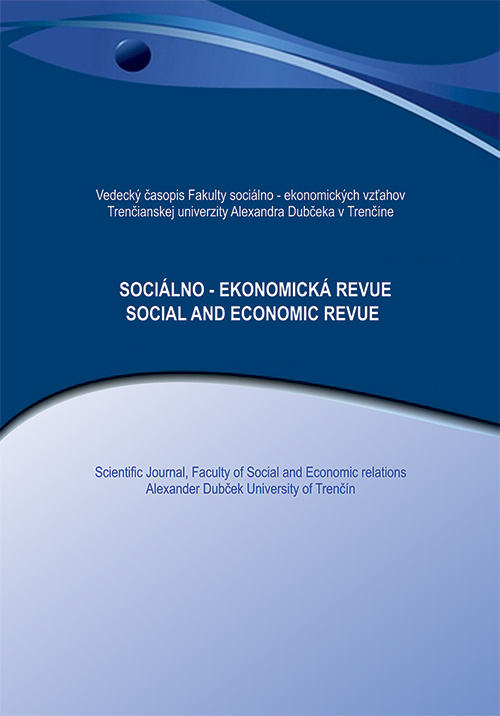KEY DETERMINANTS OF JOB SATISFACTION IN HIGHER EDUCATION
Job satisfaction is an extremely useful measurement for management and an employee's level of job satisfaction is one of the most important indicators that may help a manager solve specific employment issues. Recognizing the employee´s level or extent of job satisfaction gives employers a chance to predict and eliminate such difficulties as low productivity, work inefficiency, an employee's high rate of absenteeism, decision to resign or to retire early, or employee´s mental and physical exhaustion (burnout syndrome). The aim of the study is to highlight the significance of job satisfaction in general, and subsequently to focus on university teachers and researchers taking into account the fact that identifying job satisfaction in an academic environment is supposed to consider the unique aspects of academic work. The findings are expected to help higher education institutions to foster more positive and productive academic environment.
Vydanie: 2024/1 Strany: 22-32 Klasifikácia JEL: J28, J81, M54
DOI: https://doi.org/10.52665/ser20240103
Kľúčové slová: academic environment, employee, employer, job satisfaction, productivity, research, researcher, teacher, university, work performance
Sekcia:
Kontakty:
Eva Smetanová, PaedDr., PhD.
Faculty of Social and Economic Relations
Alexander Dubček University of Trenčín,
Študentská 3, Trenčín
e-mail: eva.smetanova@tnuni.sk
Literatúra:
Ahmad, M. A., Jameel, A. S. (2018): Factors Affecting on Job Satisfaction among Academic Staff. Polytechnic Journal: Vol.8 No. 2 (May 2018): pp:119-128. Available at: http://epu.edu.krd/ojs/index.php/Journal. [Accessed August 20 2024].
Brady, M. (2010). Healthy Nursing Academic Work Environments. OJIN: The Online Journal of Issues in Nursing, 5. Available at: https://doi.org/10.3912/ojin.vol15no01man06. [Accessed August 26 2024].
Cambridge Dictionary. Available at https://dictionary.cambridge.org/dictionary/english/academic
Cranny, C. J., Smith, P. C., & Stone, E. F. (1992). Job Satisfaction: How People Feel About Their Jobs and How It Affects Their Performance. Lexington Books.
Dimock, M. (2019). Defining Generations: Where Millennials End and Generation Z Begins. Pew Research Center.
Hee, O. Ch. et al (2020): Factors influencing job satisfaction among academic staff. International Journal of Evaluation and Research in Education (IJERE) 9(2) June 2020. DOI:10.11591/ijere.v9i2.20509 [Accessed September 2 2024].
Herzberg, F., Mausner, B., & Snyderman, B. B. (1959). The Motivation to Work. John Wiley & Sons.
Hoppock, R. and Spiegler, S. (1938), “Job satisfaction: researches of 1935-1937”, Occupations; The Vocational Guidance Journal Vol. 16, No. 7, pp. 636-43.
Jakubčinová, M. (2021): Verejný sektor v zmiešanej ekonomike. Trenčín: Trenčianska univerzita A. Dubčeka v Trenčíne. ISBN 978-80.8075-957-5.
Krajčo, K., Habánik, J., Grenčíková, A. (2024): DEA models as a tool for evaluating and measuring the efficiency of public universities. Available from: https://www.researchgate.net/publication/379715812_DEA_models_as_a_tool_for_evaluating_and_measuring_the_efficiency_of_public_universities [Accessed Sep 02 2024].
Lane, K. A. et al (2010). A Study of Nurse Faculty Job Satisfaction in Community Colleges in Florida. Teaching and Learning in Nursing, 5, 16-26. Available at: ttps://doi.org/10.1016/j.teln.2009.05.001. [Accessed August 26 2024].
Miller, Dorothy A. “The ‘sandwich’ Generation: Adult Children of the Aging.” Social Work, vol. 26, no. 5, 1981, pp. 419–23. JSTOR, http://www.jstor.org/stable/23712207. [Accessed September 2 2024].
Pauknerová, D. (2012): Psychologie pro ekonomy a manažery. Praha: Grada. ISBN 978-80-247-7655-2.
Paulise, L. (2023): Workation: Balancing Work and Vacation for Optimal Career Performance. Forbes. Available from: https://www.forbes.com/sites/lucianapaulise/2023/06/20/workation-balancing-work-and-vacation-for-optimal-career-performance/. [Accessed August 26 2024]
Porvazník, J. a kol. (1997): Celostný manažment. Bratislava: Iris. ISBN 978-80-88931-73-7.
Raziq, A., & Maulabakhsha, R. (2015). Impact of Work Environment on Job Satisfaction. Procedia Economics and Finance, 23, 717-725. doi.org/10.1016/S2212-5671(15)00524-9. [Accessed August 20 2024].
Stephen, V. (2024) Key Factors Influencing Job Satisfaction among Academic Staff in the University. Journal of Human Resource and Sustainability Studies, 12, 399-414. doi: 10.4236/jhrss.2024.123022. [Accessed August 26 2024].
Štikar, J. a kol. (2003): Psychologie ve světe práce. Praha: Karolinum. ISBN 80-246-044-85.
Twenge, J. M. (2010). Generation Me: Why Today's Young Americans Are More Confident, Assertive, Entitled—and More Miserable Than Ever Before. Atria Books.
Vojtovič, S. a kol. (2013): Personálny manažment v organizácii. Plzeň: Aleš Čeněk, s. r. o. ISBN 978-80-7380-483-1.
White, K. (2021). Generation Z vs. Generation X: Bridging the Gap. Business News Daily.
Wright, T. A. (2005). “The Role of ´Happiness´ in Organizational Research: Past, Present and Future Directions” in Perrewe, P. L. and Ganster, D. C. (Eds.) Research in Occupational Stress and Well-Being, JAI Press, Amsterdam, Vol. 4, pp. 225-68.
Živčičová, E. (2019): Psychológia práce. Trenčín: Trenčianska univerzita A. Dubčeka v Trenčíne. ISBN 978-80-8075-844-8.


